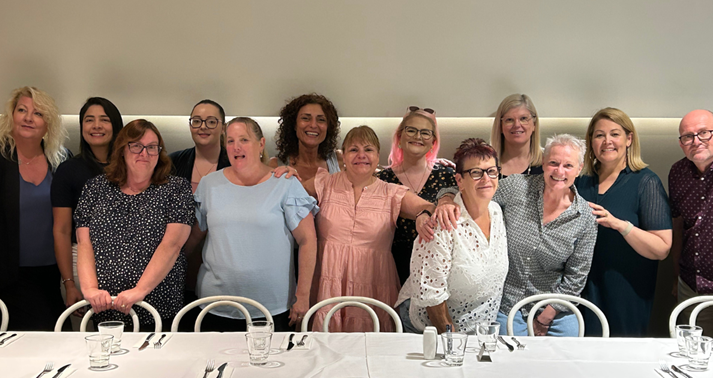Understanding the Role of an NDIS Support Coordinator in Goal Setting
10 November, 2021

The National Disability Insurance Scheme (NDIS) provides essential support for people with a disability in Australia, enabling them to live more independently and achieve their personal goals. One of the vital aspects of the NDIS journey is goal setting, and a Support Coordinator can play a pivotal role in helping participants turn these goals into reality.
This article explains the role of an NDIS Support Coordinator in goal setting, guiding participants to make informed decisions, navigate their plans, and achieve meaningful outcomes.
What is an NDIS Support Coordinator?
A Support Coordinator assists NDIS participants in understanding and implementing their plans. They work alongside people to ensure that their needs and goals are fully addressed, connecting them with services and resources suited to their unique circumstances. McArthur Community Care, a registered service provider with extensive experience in disability support, offers tailored support coordination services that empower people to live on their terms. Their qualified team can support participants in navigating the NDIS system, enhancing their capacity to manage their own supports.
There are three levels of support coordination:
- Support Connection: Helps participants understand and navigate their NDIS plans.
- Coordination of Supports: Assists with organising and linking various supports and services to achieve goals.
- Specialist Support Coordination: Provides higher-level support for participants with complex needs, addressing barriers and reducing risks.
McArthur Community Care’s experienced Specialist Support Coordinators are particularly beneficial for participants facing intensive or complex challenges, helping them build resilience and address challenges effectively.
The Importance of Goal Setting in the NDIS
Setting personal goals is a cornerstone of the NDIS, as these goals directly shape the funded supports in an person’s plan. Goals can vary widely depending on the participant’s needs and aspirations. For example, some people may wish to increase their independence at home, while others might want to build social connections, pursue education, or find employment. Clear, well-defined goals help participants and their Support Coordinators create a focused approach to achieving tangible outcomes that align with their vision for the future.
By partnering with a Support Coordinator, participants can explore and define these goals with greater clarity, ensuring they reflect their true aspirations.
How a Support Coordinator Helps with Goal Setting
A Support Coordinator serves as a bridge between participants’ goals and the practical steps required to achieve them. This includes:
Understanding Your Unique Needs and Aspirations
Support Coordinators take the time to understand participants on a personal level, listening to their hopes and challenges. At McArthur Community Care, coordinators focus on person-centred planning, working closely with participants to identify goals that matter most to them. Whether participants are seeking increased independence or new community connections, a Support Coordinator ensures the goals are realistic, empowering, and achievable within the NDIS framework.
Translating Goals into Practical Outcomes
Breaking down larger goals into manageable steps is essential. A Support Coordinator helps participants identify smaller milestones that gradually lead to bigger achievements. For instance, if a participant’s goal is to secure employment, the Support Coordinator might first assist in connecting them with vocational training or skill development services.
At McArthur Community Care, the Support Coordination team offers guidance on budget management, service provider selection, and engaging with community resources, ensuring that each step aligns with the participant’s personal and financial parameters within their NDIS plan.
Navigating the NDIS System
The NDIS can be challenging to navigate alone, particularly when it comes to understanding complex plans and funding allocations. Support Coordinators simplify this process, helping participants interpret their plans and connect with relevant providers. They are equipped to manage transitions, such as moving from home to supported accommodation or adjusting care needs when health changes occur.
McArthur Community Care goes further, linking participants to services like housing, healthcare, and community activities. This holistic approach helps participants fully utilise their plan and fosters greater confidence and independence.
Monitoring and Adjusting Goals Over Time
Goals can evolve, and a Support Coordinator helps participants review and adjust their goals as necessary. McArthur Community Care ensures that coordinators regularly check in with participants to track progress, troubleshoot issues, and refine strategies as needs change. This continuous support helps participants stay on track and adapt their goals when new opportunities or challenges arise.
How to Choose the Right Support Coordinator
Selecting the right Support Coordinator is crucial. The ideal coordinator is someone who listens, communicates clearly, and values your preferences. Important attributes to consider include their knowledge of local services, experience with complex needs, and a genuine commitment to your goals.
When choosing a Support Coordinator, ask questions like:
- How will you help me achieve my goals?
- What experience do you have with my specific needs?
- How often will we review my plan and goals?
McArthur Community Care’s approach is founded on respect for participants’ choice and control, recognising that each person knows what is best for their life. Their Support Coordinators work alongside participants, prioritising their autonomy and ensuring consistent support from plan implementation through to reviews.
How to engage with a Support Coordinator
Engaging with a Support Coordinator is about building a partnership based on trust, understanding, and a shared commitment to achieving your goals. You can initiate contact by phone, email, or through McArthur Community Care website to discuss your specific goals and circumstances. During the initial meeting, be open about your personal aspirations, challenges, and any support you feel you need. Ask questions to understand how the coordinator can assist you and ensure they have experience relevant to your goals. Additionally, establish a communication style that works best for you, whether it’s regular meetings, phone calls, or emails, to maintain an ongoing, supportive relationship.
We specialise in Support Coordination and Specialist Coordination, so get in touch with us today to make the most of your NDIS plan!
Share this Article
Related Articles
McArthur Community Care Awarded ACIS Certification and Recommended for Best Practice.
The McArthur Community Care team could not be prouder of our recent ACIS Certification and recommendation for Best Practice.
Changing NDIS Providers: How to Navigate Service Closures with Confidence
If your NDIS provider is closing services, your support does not have to stop. Discover your rights, how to switch providers with confidence, and how McArthur Community Care can ensure a smooth transition with reliable, long term support.
Learn MoreMcArthur Community Care SA Recognised for Best Practice
McArthur Community Care SA has achieved a Best Practice Rating following a recent NDIS surveillance audit, an honour awarded to only a select few providers nationwide. This milestone reflects our commitment to quality, governance, and person-centred disability support.
Learn MoreCreating a Compassionate Future for Disability Support
Empowering individuals with disability starts with equipping support workers with the right skills. McArthur Community Care advocates for quality training, respect, and inclusion to create a compassionate future for disability support.
Learn More



